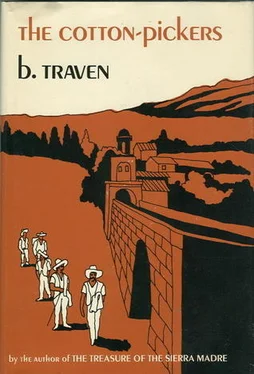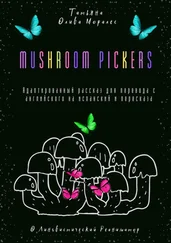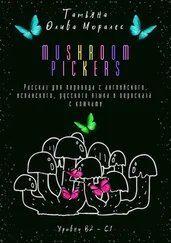B. Traven - The Cotton-Pickers
Здесь есть возможность читать онлайн «B. Traven - The Cotton-Pickers» весь текст электронной книги совершенно бесплатно (целиком полную версию без сокращений). В некоторых случаях можно слушать аудио, скачать через торрент в формате fb2 и присутствует краткое содержание. Год выпуска: 1969, Издательство: Hill and Wang, Жанр: Проза, на английском языке. Описание произведения, (предисловие) а так же отзывы посетителей доступны на портале библиотеки ЛибКат.
- Название:The Cotton-Pickers
- Автор:
- Издательство:Hill and Wang
- Жанр:
- Год:1969
- ISBN:нет данных
- Рейтинг книги:3 / 5. Голосов: 1
-
Избранное:Добавить в избранное
- Отзывы:
-
Ваша оценка:
- 60
- 1
- 2
- 3
- 4
- 5
The Cotton-Pickers: краткое содержание, описание и аннотация
Предлагаем к чтению аннотацию, описание, краткое содержание или предисловие (зависит от того, что написал сам автор книги «The Cotton-Pickers»). Если вы не нашли необходимую информацию о книге — напишите в комментариях, мы постараемся отыскать её.
—Book World
The Cotton-Pickers — читать онлайн бесплатно полную книгу (весь текст) целиком
Ниже представлен текст книги, разбитый по страницам. Система сохранения места последней прочитанной страницы, позволяет с удобством читать онлайн бесплатно книгу «The Cotton-Pickers», без необходимости каждый раз заново искать на чём Вы остановились. Поставьте закладку, и сможете в любой момент перейти на страницу, на которой закончили чтение.
Интервал:
Закладка:
Then, so as to be able to make the right impression on the señoritas, we spruced ourselves up and went in search of the real thing, warmer and sweeter than mere pictures, where life was not harsh but beautiful.
It was already evening. We had a fairly long way to go, because the señoritas lived on the outskirts of town where they had a whole quarter to themselves. This was as agreeable to them as to the men who wanted to enjoy the good things of life without having to shoulder any obligations in return.
16
We were greeted by the sound of music and gay laughter; with every step that brought us nearer to the girls the drabness and monotony of life receded. Beauty prevails where music and laughter are.
Along the houses of the quarter were concrete sidewalks, barely two feet wide. The street lay three feet and often more below the level of the sidewalk; there being no steps, you jumped if you wanted to get down. The streets were muddy, smelly swamps; stones and chunks of broken concrete lying about and deep holes filled with water left over from the last heavy rain made them practically impassable. Nevertheless, cars and taxis churned their way through to bring, wait for, and pick up passengers. Frequently, cars got stuck in the mud and then there was a great clattering, banging, and hollering as they worked their way out. The drivers didn’t complain, but laughed and took it as part of the game, without which the quarter most certainly wouldn’t have been what it was.
At street corners were small groups of strolling musicians who played very well, much better in fact than the street bands in town, where there were so many that they stumbled over each other’s feet. The bands usually consisted of a violin, cello, clarinet, flute, and drum. Some had a trumpet instead of a flute. Others had a violin, saxophone, cello, and guitar, and these were invariably the best. After they performed they passed a hat around, but it was rare for a visitor to put in something, and it was mostly the girls who gave them money.
The bands also went into the restaurants and bars and played there, where their chances of money, if slim, were better than out in the street. In every café and bar there was dancing, for every place had its girls who were supposed to smile and dance and drink with the customers, and whose chief job it was to make them spend money, of which they of course got their percentage.
While they were dancing the little people could tell each other everything that was uppermost in their hearts without saying a word. There were no taboos as to the style or manner of dancing. Consequently, most people danced so decently that the angels in heaven could have watched without blushing. But now and then a couple might dance in a style that would have made the devil’s grandmother hide her face in her apron. But she did not see it, having more dire things to watch elsewhere, and other people did not worry about it; and the patrolling policeman lit a cigarette, watched smiling for a second, and continued on his beat.
A Negro dancer from Virginia was performing in La Casa Roja as we were passing. She was alone in the center of the café, dancing the belly dance — but the genuine belly dance, the belly dance that Eve invented after she got out of Paradise and could do as she pleased. Not only the men but all the girls in the place rose to watch this piece of supreme art, and perhaps to learn gestures and rhythms that might be useful to them when they weren’t sleeping alone. Those out in the street pushed in at the open doors to look on.
At the end of the dance, she sank to the floor. Deafening applause rang out from every side. There she knelt, her arms thrown back, her breasts quivering, her body rippling and heaving with a final expiring sigh such as might follow the last tired drop of a dying mountain stream. Wearily she drew in her belly and let her head drop, tired and spent, until her forehead touched the floor. Then she sprang up with a jubilant cry of deep and healthy joy; slim and erect she stood there, her left hand pressed against her hip, her right thrown high in a gently rounded gesture. Her eyes sparkled and her white teeth gleamed between her full lips. And she laughed a victorious laugh, arched her body forward with an eagerness which seemed to invite a whole continent to embrace her, and cried out, “Viva el amor y la alegria, amigos! Viva el amor! Viva!”
A short silence followed. Then the applause thundered out again, the music following it loudly. Now the dancer tugged her thin gown into place, smoothed back her thick hair, and stepped to her table where only her bottle and a glass awaited her.
What is art? Art is that which amazes and rejoices our souls. Thus, the belly dance of the Virginia Negress was true art, natural and mature.
The men were looking at her with awe and genuine admiration but, strangely enough, none approached her or asked her to dance. Perhaps, because she was an artist, favored by the gods, they felt they did not have enough to offer her. They went up to other girls who were more modest in appearance and who didn’t give intimations of such hurricanes of passion as would threaten to unhorse the most accomplished Casanova.
The girls didn’t regard the dancer as a rival competing by unfair means — not in the least; for she gave the business an élan which it had lacked ten minutes earlier. Now the men had fire in their eyes, whereas before they had appeared indifferent, disinterested — yes, even bored.
Antonio and I had been watching from the doorway of the café, and I had lost him in the crowd. Now I saw him inside. He had found himself a dancing partner. So I left him at the Casa Roja and went out to have a look around the quarter.
The streets were crowded with vendors, their tiny temporary stalls giving the whole place the atmosphere of a fair. There were stalls that served hot enchiladas, stalls offering tacos, crisp rolls filled with roast beef, ham, fried fish, sausage, or cheese. There were hot tamales and corn on the cob for sale. You could buy avocados, bananas, oranges, slices of watermelon and pineapple, and chunks of coconut. Some small booths sold cigarettes, cigars, pipe tobacco, candy, newspapers, and magazines — local ones and foreign (American, British, French, or what have you) . At many little table stalls you could buy iced drinks in half a dozen exotic flavors — horchata, jamaica, tamarindo, chia, papaya, and mamey. And in the thick of the swarming streets women and boys approached the crowds carrying baskets or cigar boxes filled with candy, chewing gum, matches, lottery tickets, toasted pumpkin seeds, peanuts, sugar-coated fruits, and flowers.
More than a hundred traders made their living here. Women nursed their babies in their arms and led their small children by the hand as they sold their goods. Neither the morals of the teenagers who shouted their wares for sale nor those of the women vendors and the children at their skirts were endangered in this environment.
Hundreds of respectable women, girls, and children — whole families, in fact — passed through the quarter to reach their homes. They thought nothing of it. To the pure, all things are pure. They could have gone another way, but the way through the quarter was the most direct.
In the whole section only four policemen and an officer were needed. They seldom had trouble to straighten out; and if they did, it was regarded as an event. Very few drunks had to be taken into custody, for drunks were rarely seen there. Besides the uniformed police, there were two or three plain-clothesmen, who mingled with the people, on the lookout for international opium, marijuana, and cocaine dealers who might be doing business in the area.
The other representatives of the authorities in power that you could see snaking their way through the crowd were the inspectors of the Public Health Department and, of course, the tax collectors. Everybody around here, itinerant trader, stall owner, or barkeeper, and of course the ever-smiling girls, had to pay taxes; not by next April, oh no, but right here and on the spot, in cash, no checks accepted — or out you go immediately. The taxes, high or low, were paid not just because the tax collector was such a pleasant fellow; taxpayers got an unlimited protection for their business. And as you would expect in a really democratic Republic, in any doubtful case the girls got an immediate and a better protection than the men who tried to run away without paying for the services they had received.
Читать дальшеИнтервал:
Закладка:
Похожие книги на «The Cotton-Pickers»
Представляем Вашему вниманию похожие книги на «The Cotton-Pickers» списком для выбора. Мы отобрали схожую по названию и смыслу литературу в надежде предоставить читателям больше вариантов отыскать новые, интересные, ещё непрочитанные произведения.
Обсуждение, отзывы о книге «The Cotton-Pickers» и просто собственные мнения читателей. Оставьте ваши комментарии, напишите, что Вы думаете о произведении, его смысле или главных героях. Укажите что конкретно понравилось, а что нет, и почему Вы так считаете.











